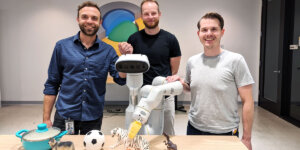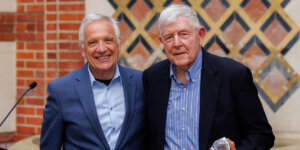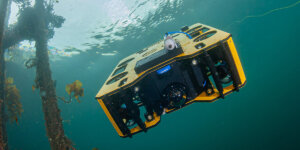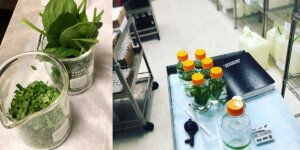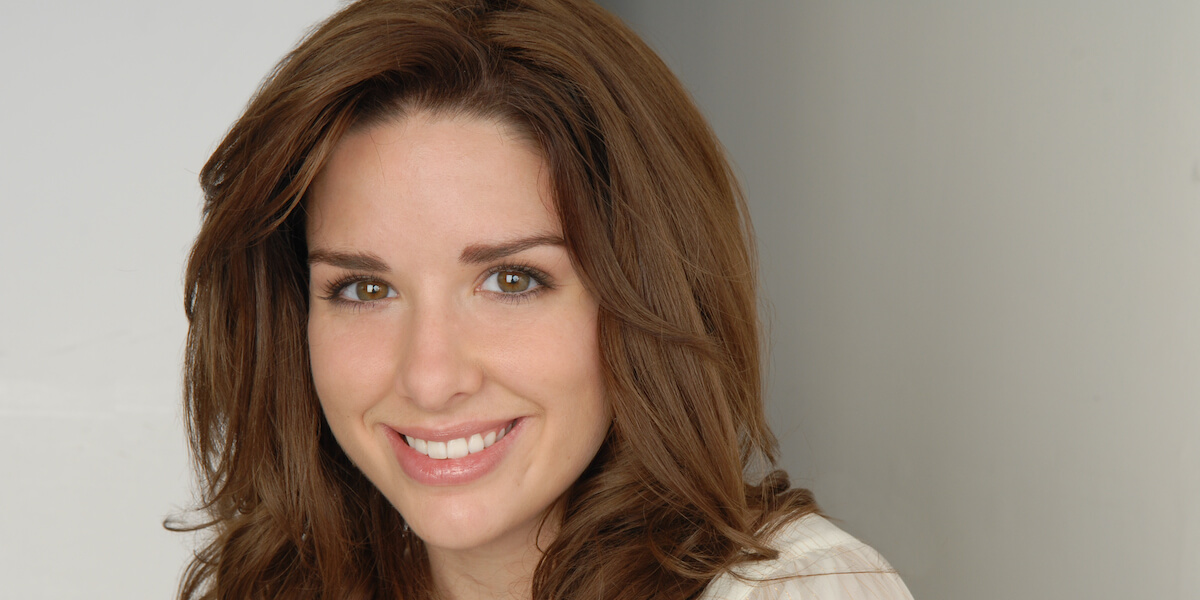
Melissa Banks, graduating senior in the Department of Biomedical Engineering, is researching copper coatings to improve the effectiveness of face masks. Image/Melissa Banks
Melissa Banks has taken a shine to copper.
Inspired by the material’s natural anti-viral properties, the USC Viterbi School of Engineering graduating senior has been applying this to her research project – a copper coating for face masks that will allow them to be reused, improving their effectiveness and reducing waste.
As the U.S. gradually emerges from the COVID-19 pandemic, it’s clear that face masks may still be part of our lives into the future, while we continue to manage virus variants and plan for the possibility of future pandemics.
In the early days of the pandemic, as critical personal protective equipment (PPE) shortages hit around the world, USC Viterbi Dean Yannis C. Yortsos helped shape the National Academy of Engineering’s COVID-19 Call for Action. The initiative was a research incubator where engineering students and professionals could develop solutions to the most pressing problems of the pandemic.
The initiative prompted Banks, a biomedical engineering student, to consider how copper could be harnessed to vastly improve our PPE stocks so that such dangerous shortages wouldn’t happen again. Her proposal was selected as part of the Call for Action incubator.
“Copper is something that has always been interesting to me, because we’ve literally been using it since ancient Egypt. It’s part of The Edwin Smith Papyrus (an ancient medical text), where they even knew back then that copper had antibacterial properties,” Banks said.
“At around the same time in India, a lot of parents realized that if they kept their drinking water in copper jugs, their children got sick less frequently. It helped with infant mortality,” she said.
Banks said that she was interested in a project that she could work on herself, that did not require a lot of complex equipment and resources, which were difficult to access during the work-from-home period. She saw that one of the most urgent issues was something that could extend the amount of time that masks could be safely used in clinical settings.
“So even if we’re only extending the use by a week, and then to be safe you throw them away, that’s a huge increase from the start of the pandemic, when the CDC was saying to throw these masks away after each interaction with an infectious patient,” Banks said.
During the pandemic, the gold standard of masks for healthcare professionals has been the N95. The mask’s unique construction posed some challenges for Banks as she looked at ways to extend its shelf life.
Banks said N95s are created through a process of melting and blowing in order to form the fabric, as well as a static charge that works like a magnet, both filtering and attracting the virus.
“I knew I didn’t have the ability to make those type of masks without some major equipment,” Banks said, “but instead I could just formulate a copper dip coating, something that could work on the plastics that they use. And obviously it’s tricky to adhere coatings to plastics, and also making sure that it would be safe to keep close to your mouth is another challenge.”
She took a number of approaches to get the copper coating to distribute across the mask. The first was an investigation into whether creating a rougher surface on the plastic would allow the copper formulation to permeate the mask – a difficult ask given the delicate nature of N95 materials.
“Then it became a matter of getting the particles small enough that we could get good adherence because the particles can work their way into the boundary layer,” Banks said.
Banks, who is originally from Kentucky, said that when she was first accepted into the Call to Action program, she was one of the few solo student researchers in the initiative.
“Columbia was there, and there were Ph.D. lab teams, and to be honest, I felt a little unprepared. I wanted a team too!”
She was soon able to pair up with a fellow BME student Sameeksha Agrawal, along with Professor Gerald Loeb in the Department of Biomedical Engineering, who offered support and advice.
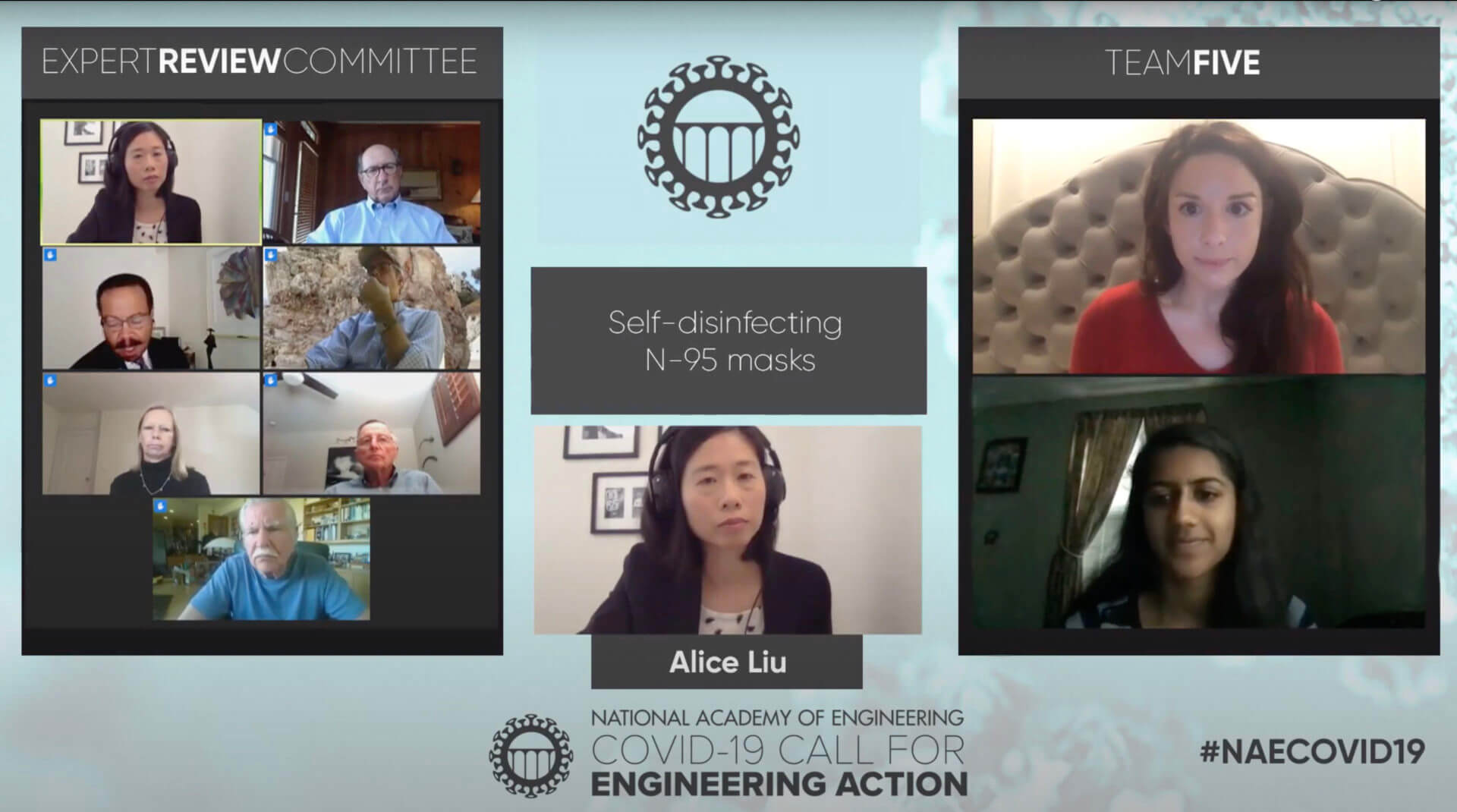
Melissa Banks and Sameeksha Agrawal present their mask project at the NAE’s Call for Action.
Banks said while she is still in the early stages of her project, she is hoping to continue working on the copper coating formulation as she continues at USC, undertaking her master’s in the Department of Biomedical Engineering.
Banks first came to USC with a background in dietetics, focusing on nutritional biochemistry. Her interest in engineering approaches to medical challenges came after she began her career working in dialysis in Kentucky, and noticed how clinics needed to be kept very cold in order to stop bacteria from spreading, which was uncomfortable for patients undergoing treatment.
“There have been amazing strides that have been made by all of the people who came before me, but at the same time there’s room for improvement. If we can help them, and we can work to lessen the bacterial proliferation in these clinics and on the dialysis machines themselves, I think that we can improve conditions for patients,” Banks said.
This experience made Banks realize that while she loved healthcare, she wanted to work on building devices within a healthcare setting. She said her ultimate goal was to work on medical device applications within women’s health.
“I feel like a different person from when I started, even though I have only been at Viterbi for two years because I had transfer credits from my first degree. But getting an engineering education has been like learning three new languages and seeing the world differently,” Banks said.
“It’s really changed everything for me,” she said.
Published on May 14th, 2021
Last updated on May 14th, 2021




